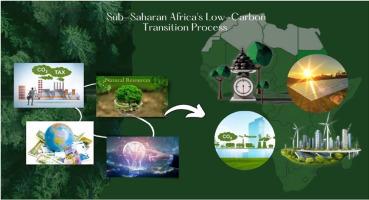Could Africa leapfrog to a low-carbon future? Evidence on the nexus between environmental tax, foreign direct investment, resource dependence, and technological progress
IF 8
2区 环境科学与生态学
Q1 ENVIRONMENTAL SCIENCES
引用次数: 0
Abstract
The devastating impact of climate change has intensified discussions on balancing sustainable economic growth with environmental sustainability achievement. To contribute to the discourse, this study explores how environmental tax, foreign investment, natural resource (NRR), and technological innovation impact Sub-Saharan Africa's efforts towards a low-carbon future. Using data from 1995 to 2019 and advanced methodologies (Cross Sectional Augmented Autoregressive Distributed Lag, and Method of Moments Quantile Regression), the results showed that environmental taxes effectively minimize carbon emissions. FDI in the short run causes carbon emissions to rise slowly but causes a significant reduction in the long run. An increase in natural resources rent was found to cause damage to the environment significantly while technological innovation in the long run demonstrates a significant reduction in carbon emissions. The MMQR results confirm environmental tax significantly reduced CO2 emissions in all the quantiles. FDI and Technology in the long run cause a reduction in CO2 emissions while natural resource rent causes environmental destruction in all the quantiles. We recommend that policymakers introduce more carbon tax policies, establish sub-regional carbon offset markets, and prioritize the development of clean energy infrastructure.

非洲能否跨越式地实现低碳未来?环境税、外国直接投资、资源依赖和技术进步之间关系的证据。
气候变化的破坏性影响加剧了关于平衡可持续经济增长与环境可持续性成就的讨论。为了促进这一讨论,本研究探讨了环境税、外商投资、自然资源(NRR)和技术创新如何影响撒哈拉以南非洲实现低碳未来的努力。利用 1995 年至 2019 年的数据和先进的方法(横截面增强自回归分布滞后和矩量回归法),研究结果表明,环境税能有效地将碳排放量降至最低。外国直接投资在短期内会导致碳排放量缓慢上升,但在长期内会显著减少。研究发现,自然资源租金的增加会对环境造成严重破坏,而长期来看,技术创新会显著减少碳排放。MMQR 结果证实,环境税在所有量级上都能显著减少二氧化碳排放量。从长期来看,外国直接投资和技术会导致二氧化碳排放量减少,而自然资源租金则会导致所有量级的环境破坏。我们建议决策者引入更多的碳税政策,建立次区域碳补偿市场,并优先发展清洁能源基础设施。
本文章由计算机程序翻译,如有差异,请以英文原文为准。
求助全文
约1分钟内获得全文
求助全文
来源期刊

Journal of Environmental Management
环境科学-环境科学
CiteScore
13.70
自引率
5.70%
发文量
2477
审稿时长
84 days
期刊介绍:
The Journal of Environmental Management is a journal for the publication of peer reviewed, original research for all aspects of management and the managed use of the environment, both natural and man-made.Critical review articles are also welcome; submission of these is strongly encouraged.
 求助内容:
求助内容: 应助结果提醒方式:
应助结果提醒方式:


